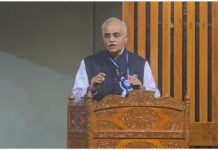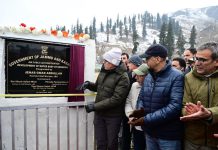In Kashmir, one in three adults has hypertension and with temperatures plummeting across the Valley, medical experts are raising alarms about the rising risks of hypertension during the winter months, highlighting the need for regular monitoring and precautionary measures.
Cardiologists shared their insights on how cold temperatures, lifestyle changes, and dietary habits during winter contribute to an increase in high blood pressure and related health complications.Senior cardiologist at Sher-e-Kashmir Institute of Medical Sciences (SKIMS), Soura, Dr Imran Hafeez said that cold weather has a direct impact on blood pressure.
“Cold exposure leads to vasoconstriction, which is the narrowing of blood vessels, causing an increase in blood pressure. For people with existing cardiovascular or cerebrovascular conditions, this can significantly raise the risk of heart attacks, strokes, and other severe health events,” he said.
Dr Hafeez emphasised the importance of home blood pressure monitoring, noting that blood pressure should ideally be below 135/85 mmHg to reduce health risks.
He also pointed out that while antihypertensive medications could be taken at any time, studies have shown that evening doses can provide better control of blood pressure levels.
“It’s crucial to remain consistent with medication, as this can help mitigate the seasonal spikes in blood pressure caused by the cold,” Dr Hafeez said. “Hypertension doesn’t show symptoms until it’s too late, so regular monitoring and a proactive approach to treatment are crucial. This is especially true during winter when the risk is higher.”
Cardiologist at SMHS Hospital Srinagar, Dr Irfan Ahmed Bhat also shed light on the specific factors that contribute to hypertension during winter.
“During the colder months, we see an increase in the consumption of salt, particularly in traditional Nun Chai. Additionally, many processed foods contain hidden sodium, which exacerbates blood pressure problems,” Dr Bhat said.
He said that while people were more likely to indulge in these foods during winter, it was essential to monitor their salt intake to prevent triggering hypertension.
Dr Bhat said that over-the-counter cold medications, decongestants, and cough syrups, which are commonly used in winter, could also elevate blood pressure.
“These medications can have a vasoconstrictive effect, leading to an increase in blood pressure, so it is important to consult a doctor before taking any medicine,” he said.
Dr Bhat also discussed a unique phenomenon he calls “winter hypertension,” where people who may not have hypertension in the warmer months or when living in other parts of the country or abroad develop elevated blood pressure during the cold season.
“The cold weather here in Kashmir plays a major role in triggering hypertension. Many people who don’t have high blood pressure during other seasons find themselves battling the condition in winter,” he said.
The recent data released by the Indian Council of Medical Research (ICMR) highlights the growing prevalence of hypertension in Kashmir and Ladakh, with 30 percent of adults in the region affected by the condition.
This increase is attributed to a combination of genetic, dietary, and lifestyle factors, exacerbated by the seasonal shifts.
The cold months, with their unique set of challenges, appear to compound the issue, making it a significant public health concern.
Cardiologists believe that hypertension is a silent but dangerous condition that can lead to life-threatening events if left unchecked.
They emphasise the importance of regular health check-ups, especially during winter, to ensure that individuals at risk are managing their blood pressure effectively.




